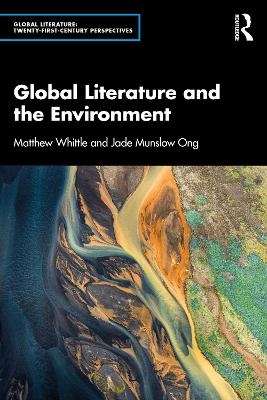
Global Literature and the Environment
Seiten
2024
Routledge (Verlag)
978-0-367-37368-9 (ISBN)
Routledge (Verlag)
978-0-367-37368-9 (ISBN)
Global Literature and the Environment analyses literatures from across the world that connect readers to the impacts of the climate and ecological emergencies. The book contextualizes ecological breakdown within the history of imperialist-capitalism, exploring how literature helps us to imagine and create a habitable and just world.
Global Literature and the Environment analyses literatures from across the world that connect readers to the localized impacts of the climate and ecological emergencies. The book contextualizes ecological breakdown within the history of imperialist-capitalism, exploring how literature helps us to imagine and create a habitable and just world for all forms of life.
The four chapters are organised according to the elements of the climate system that are at risk. ‘Earth’ examines Caribbean, American, South African, and British literatures that explore how dominant human groups have exploited soils, minerals, metals, and oil in pursuit of economic aims. ‘Water’ engages with poetic representations of, and responses to, extraction, pollution, and global warming in the fresh- and saltwaters of Nigeria and the icescapes of Alaska. ‘Air’ analyses prose and poetry that depicts atmospheric pollution caused by gas flaring in the Niger Delta and the production of pesticides in India. ‘Life’ attends to the ways in which literature contextualizes the drivers of, and proposed solutions to, mass species extinction across North America, Africa, Australasia, and Aotearoa New Zealand.
This accessible and engaging book explores novels, plays and poetry by writers including Octavia Butler, C.L.R. James, dg nanouk okpik, Ken Saro-Wiwa, Imbolo Mbue, Indra Sinha, Witi Ihimaera, J.M. Coetzee, and Henrietta Rose-Innes, amongst many others. It introduces readers to the concept of the Anthropocene alongside perspectives that challenge the assumption that the climate crisis is caused by an undifferentiated humanity. In doing so, the book draws on, and combines, a range of theoretical approaches, including postcolonialism, Indigenous studies, ecocriticism, cultural materialism, and animal studies.
Global Literature and the Environment analyses literatures from across the world that connect readers to the localized impacts of the climate and ecological emergencies. The book contextualizes ecological breakdown within the history of imperialist-capitalism, exploring how literature helps us to imagine and create a habitable and just world for all forms of life.
The four chapters are organised according to the elements of the climate system that are at risk. ‘Earth’ examines Caribbean, American, South African, and British literatures that explore how dominant human groups have exploited soils, minerals, metals, and oil in pursuit of economic aims. ‘Water’ engages with poetic representations of, and responses to, extraction, pollution, and global warming in the fresh- and saltwaters of Nigeria and the icescapes of Alaska. ‘Air’ analyses prose and poetry that depicts atmospheric pollution caused by gas flaring in the Niger Delta and the production of pesticides in India. ‘Life’ attends to the ways in which literature contextualizes the drivers of, and proposed solutions to, mass species extinction across North America, Africa, Australasia, and Aotearoa New Zealand.
This accessible and engaging book explores novels, plays and poetry by writers including Octavia Butler, C.L.R. James, dg nanouk okpik, Ken Saro-Wiwa, Imbolo Mbue, Indra Sinha, Witi Ihimaera, J.M. Coetzee, and Henrietta Rose-Innes, amongst many others. It introduces readers to the concept of the Anthropocene alongside perspectives that challenge the assumption that the climate crisis is caused by an undifferentiated humanity. In doing so, the book draws on, and combines, a range of theoretical approaches, including postcolonialism, Indigenous studies, ecocriticism, cultural materialism, and animal studies.
Matthew Whittle is Lecturer in Postcolonial Literature at the University of Kent, UK. He is the author of Post-War British Literature and the “End of Empire” (Palgrave Macmillan, 2016). Jade Munslow Ong is Professor of World Literatures in English at the University of Salford, UK. She is author of Olive Schreiner and African Modernism: Allegory, Empire and Postcolonial Writing (Routledge, 2018).
Introduction
Chapter One: Earth
Chapter Two: Water
Chapter Three: Air
Chapter Four: Life
Conclusion
Glossary of Key Terms
Suggested Further Reading
Index
| Erscheinungsdatum | 10.07.2024 |
|---|---|
| Reihe/Serie | Global Literature |
| Verlagsort | London |
| Sprache | englisch |
| Maße | 156 x 234 mm |
| Gewicht | 420 g |
| Themenwelt | Geisteswissenschaften ► Sprach- / Literaturwissenschaft ► Anglistik / Amerikanistik |
| Geisteswissenschaften ► Sprach- / Literaturwissenschaft ► Literaturwissenschaft | |
| Naturwissenschaften ► Biologie ► Ökologie / Naturschutz | |
| Technik ► Umwelttechnik / Biotechnologie | |
| ISBN-10 | 0-367-37368-8 / 0367373688 |
| ISBN-13 | 978-0-367-37368-9 / 9780367373689 |
| Zustand | Neuware |
| Haben Sie eine Frage zum Produkt? |
Mehr entdecken
aus dem Bereich
aus dem Bereich
Poetik eines sozialen Urteils
Buch | Hardcover (2023)
De Gruyter (Verlag)
CHF 83,90
Buch | Softcover (2024)
belleville (Verlag)
CHF 27,95


